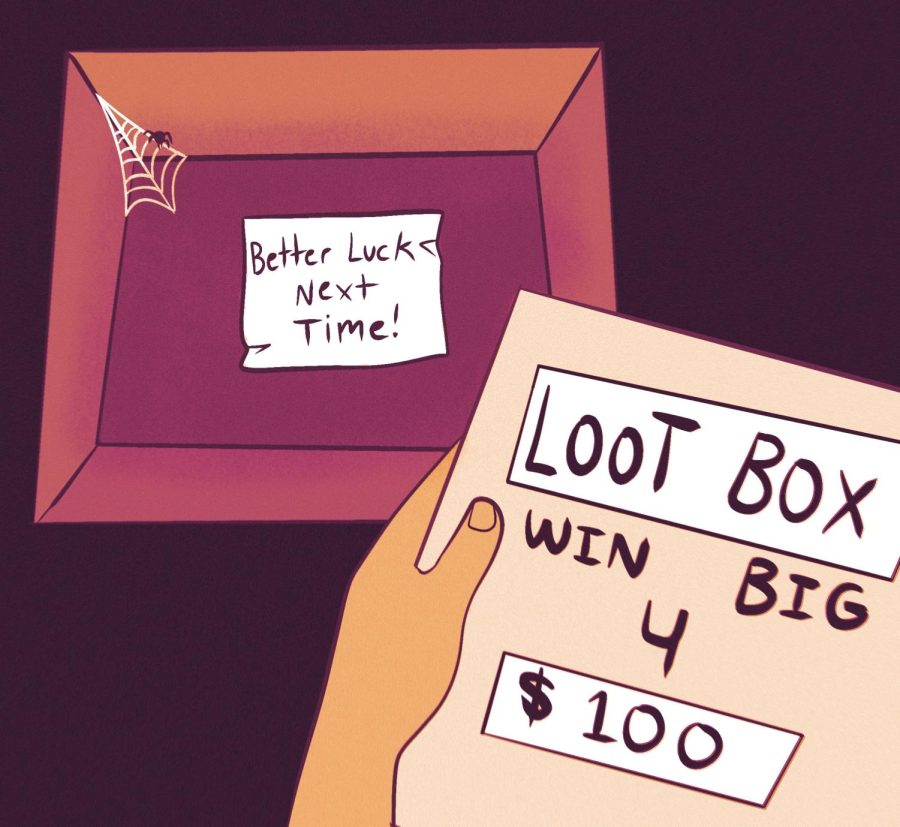Opinion | False promises plague video game industry
April 22, 2022
Even if one is not a video game hobbyist, following the gaming community can be entertaining, as every minor inconvenience, imperfection or delay has the potential to ignite a large controversy.
Although a quick glance paints gamers as whiny, entitled adolescents, many of the most memorable controversies explain why it has become such an emotionally volatile community: greed. The average gamer has found a sense of community with other gamers, only to have the pot slowly heated up by these large corporate developers who squeeze them for more money with every release.
The drama that unfolds within the industry is a constant struggle between profit-driven corporations, who wish to financially drain their loyal fans, and their fanbase, who use every minor inconvenience or delay as a sigil to launch an unsuccessful boycott.
In 2018, Blizzard Entertainment faced criticism for its condescension during a reveal. Its fans long-awaited the announcement of a new Diablo game, only to be met with a hyped announcement for a mobile app. When the crowds reacted negatively, Blizzard developer Wyatt Cheng retorted, “Do you guys not have phones?”
It may seem silly, but rather than listen to its consumers, Blizzard would follow the trend of profiting off of apps and then dismiss their disappointment.
Get The Daily Illini in your inbox!
A year before, in 2017, Electronic Arts, one of the developers whose reputation is regarded as especially greedy, broke the internet with Reddit’s most downvoted comment ever, for which it received a Guinness World Record.
EA released “Battlefront 2,” an anticipated title, with much of the content locked. To unlock some characters, it was estimated to take at least 40 hours of playing — or one could buy loot boxes to get more credits. When asked about this on Reddit, EA said the intent was to provide players with “a sense of pride and accomplishment.” Players argued it was a “pay-to-win” scheme.
In 2018, Bethesda launched “Fallout 76” and faced backlash for delivering an unfinished, buggy, empty game to players who had already paid $60 to pre-order the base game. And in 2020, CD Projekt Red’s “Cyberpunk 2077” had such an awful launch, it was pulled from Sony’s digital store and refunds were granted.
Although it wasn’t made by a large developer, the terrible 2016 launch of the highly-anticipated No Man’s Sky supports a common pattern of overpromising and underdelivering.
The video game community has rightfully become so jaded that when a developer releases a quality game with no additional strings attached beyond the initial price tag, it’s lauded as a saint.
Rockstar Games maintained a high-quality reputation after releasing “Grand Theft Auto V” and “Red Dead Redemption 2,” but even they are guilty of exorbitant micro-transactions with its Shark Cards.
In 2015, Rockstar ostensibly raised the price of “GTA V” just before a Steam Summer Sale and touted a discount. A $60 game became a 25% off $60 bundle with the game and some in-game currency, which is incredibly misleading. It is not the first company to be accused of price hikes before a sale season, but this time the U.K.’s Advertising Standards Authority actually admonished Valve, the owner of online retailer Steam.
Some developers have flirted with false advertising. Both “The Division” and “Watch Dogs” were accused of graphical downgrades after unveiling at Electronic Entertainment Expo.
All of the aforementioned barely scratch the surface of the controversies. Game developers are constantly ensconced in scandals, yet still manage to make millions.
Big-name developers have become increasingly shameless with loot boxes, microtransactions and subscription models not just for a game or online service, but now separate subscriptions for downloadable content access. Some companies have pledged “no-paid DLC” only to renege later.
While it would be great to just encourage gamers to stick with indie developers and forget rapacious triple-A developers, even indie developers are guilty of accepting money during early access for a promising new game on Steam and then fleeing like bandits before finishing.
Now, Microsoft will acquire Activision Blizzard for $69 billion, the largest gaming acquisition in history. And according to one source, 10 of the 15 biggest gaming company acquisitions have happened in the last three years.
The FTC must enforce antitrust laws and prevent these large mergers. Otherwise, the entire market will be captive to a few greedy companies who continue to shamelessly overcharge.
Additionally, the video game industry needs to analyze and reflect more on the history of its products.
It wouldn’t just be helpful in order to examine the rising costs of video gaming. It would also help to review toxic workplace cultures, which have been alleged in many developer offices (Telltale and Ubisoft), toxic gamer communities and why some features are popular, like skill trees, while others have disappeared entirely, like couch co-op.
The industry has seen many improvements in the last decade, but it has also substantially worsened.
The gaming industry acts as a microcosm for modern corporate behavior, endless horizontal integration and corporate consolidation. It holds shareholder profits above all other priorities, including product quality and consumer satisfaction. It forbodes the souring company-customer relationship in all industries, not just gaming. That’s why it’s so important to care.
Video gaming is a huge, diverse market. The stories that define it may seem like immature, petty squabbles, but they reflect a more sinister problem of how avarice is motivating developers and false expectations excite gamers. With these two irreconcilable, unaligned interests, the industry will continue to spiral through outrage and spring from one dissatisfaction to the next as greed governs gaming.
Andrew is a senior in LAS.







